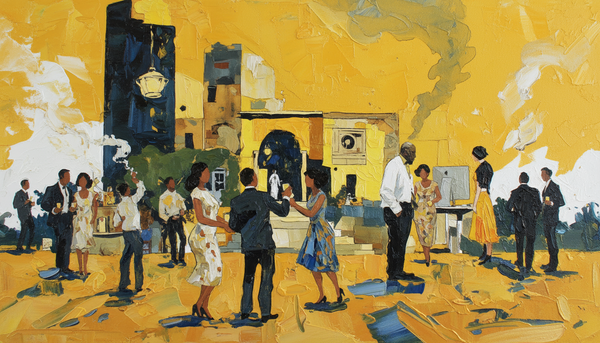There's a research paper I came across a number of years ago that I look back to again and again. It's called Go to More Parties: Social Occasions as Home to Unexpected Turning Points in Life Trajectories, published in 2019 in Social Psychology Quarterly.
The paper is by Alex Goffman of the University of Wisconsin‑Madison. The paper explores the impact of social occasions on people's lives through analyzing parties and events she attends herself, asking her students to similarly write about social occasions they have attended and what happened there, and finally reviewing three dozen memoirs to try and identify the triggers for life and identity changes.
Her conclusion is best illustrated by a quote on collective effervescence by early 20th century French sociologist Émile Durkheim in his 1912 book The Elementary Forms of the Religious Life.
‘‘In the midst of an assembly animated by a common passion, we become susceptible of acts and sentiments of which we are incapable when reduced to our own forces."
Basically, parties heightens our emotions and open us up to new ideas and behaviors we might not otherwise engage in. This amplification—collective effervesce—causes the social interaction to have a greater impact on our relationships and our own identity and can sometimes lead to an unexpected turning point in your life.
I once hosted a birthday party which my girlfriend at the time (now wife) found a bit overstimulating as an introvert. She found shelter via a new pal she made at the party. This friend became so close to both of us that we asked her to be the officiant at our wedding.
It seems obvious but it's worth saying. Going to parties and events is a powerful way to:
- Expand your network
- Find a romantic partner
- Get out of a rut
- Live a more interesting life
The article notes that certain social occasions (weddings, birthdays, anniversaries, holidays) are rare and often take place in unique locations, which makes them feel like a special world outside of the ordinary. There's often a public ranking, a complex social choreography, a collision of people from different circles, and most actions and conversations have an audience (others are listening, and watching).
Things that happen at events feel more real, because they are cemented in the minds of everyone there. And this can lead to negative outcomes too, as the paper acknowledges. Not being invited to an event can hurt. Fights, insults, and humiliation can occur and are harder to brush off after the fact.
But they can also be transformative in a positive way.
I was recently at a friends wedding. In fact I would call this person my best friend. I was not only his groomsman, I was the best man. This experience changed my sense of our 18 year friendship. It made me appreciate his role in my life and my role in his.
We probably should go to more events, but we are going to fewer. Derek Thompson has a great piece on the decline of the American party in The Atlantic but this chart kind of says it all.

Dude. A near 50%+ or more decreases in every age range besides 55-64? That's bad. Of course screens and feeds have enabled a different kind of connectivity, but the IRL event still creates a more heightened awareness that no Zoom call can match.
So how you can change this for yourself?
- Host a second-degree dinner
- Attend an Interintellect salon
- Invite folks to your house plant's 1 year anniversary of not dying
- Start an in-person podcast
- Make more of an effort to attend your friend's invites!
Look, I know it's not easy.
Personally, I get few party invites these days, and I have little time and energy to host gatherings. My house is filled with baby gear, so we have to go out, which costs more money and adds coordination hassles.
Lately I feel I don’t have the energy to make a new friend. Even if I like someone at a party, I’m not sure I’ll stay in touch, get their information, and meet up again. I’m not sure if the pandemic changed this or what, but it doesn’t feel great.
But re-reading this paper reminds me of the importance of social occasions. The paper has this delightful paragraph near the end that I'll conclude with here:
Indeed, a rich variety of phenomena, such as the development of weak and strong ties, embarrassment, fortuitous encounters, the emergence of religious identity and belief, meeting one’s future spouse, the activation of job networks, the building up or draining of emotional energy, peer pressure, acts of acute disrespect, critical consciousness, binge drinking, and sexual assault, become more meaningful when considered in the context of social occasions, because social occasions are where they happen. It is here, inside the electric, intense, connected energy of occasions, that people make new friends, heal old wounds, hatch plans, and cross the line.
(Emphasis mine)

